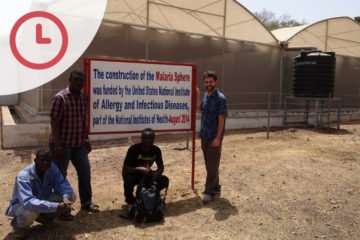Podcast Available on iTunes and Spotify.
Welcome back to Five Minutes, the podcast series where we speak to the most interesting people in the world of malaria.
Today, we’re joined by Cheyenne Cook from the Vector LearningXChange platform. The platform has been designed for vector control stakeholders from around the world to learn from each other about the most effective ways to prevent malaria. Think of it as the Facebook of malaria control programmes.
You can view all of the details about the Vector LearningXChange platform on our website, fightmalaria.co.uk
This is Five Minutes with Cheyenne Cook.
Give us a short overview of what your role is within the Vector LearningXChange platform?
I manage the Vector Learning Xchange platform. My role is to ensure that the site is up to date with the most recent and relevant resources, tool kits, job aids and training guides for those who are implementing malaria and vector control programs. In addition to that, I reach out to stakeholders and others in the community to host webinars to facilitate knowledge sharing and information exchange so that we can all benefit from others’ best practices. We’ve had one webinar since the site’s launch on building the capacity for gender integration in malaria control programming – that was a great start and we’re excited to facilitate more dialogue on other topics as well.
What is the Vector LearningXChange platform?
The Vector Learning Xchange platform is a one-stop shop for resources, tool-kits and training guides for those implementing malaria and vector control programs. It is also a space to discuss challenges and best practices in implementing these programs.
Where do you currently operate and why this particular area?
The VLE is a non-proprietary site that is intended to represent all malaria stakeholders. We want everyone to contribute to the lessons learned in malaria prevention.
Say that I’m a vector control stakeholder, how can your service enable me to improve my operations?
The resources that we offer are all gathered from experts that have been implementing malaria control programs for years – sources like WHO, PMI, USAID, etc. Because these resources are gathered from those who have been successful in their programming it allows for you, as a vector control stakeholder, to learn directly from others the tried and true methods of malaria control.
There is increasing resistance to various forms of insecticide, how concerned are you that insecticides will cease to be effective, potentially causing a resurgence?
I personally feel confident that the research on how to mitigate this issue of insecticide resistance will continue to be fruitful. The President’s Malaria Initiative has recommended that NMCPs develop long-term strategies for prolonging the inevitable evolution of resistance in vector mosquitoes. These strategies include integrated vector management, like the combination of IRS and bed net use. Additionally, switching insecticides as part of a program’s insecticide rotation is also recommended to mitigate the development of resistance. IVCC is a product development partnership whose mission is to address the growth of insecticide resistance in vectors, by developing new insecticides for use in bed nets and indoor residual spraying. Their goal is to bring three new insecticides to market by 2022, and this will go a long way in providing effective insecticide options for vector control programs and towards the overall goal of rotating insecticides to mitigate resistance. The World Health Organization has also recommended the use of Sumishiled from a new class of insecticides for IRS. The insecticide developed by Sumitomo Chemical in Japan, is the first new insecticide recommended for use in public health in 40 years. The PMI VectorLink Project recently concluded a successful spray campaign with the insecticide, and we’re now working to include Sumishield as part of our rotation in future spray campaigns. Further research into other vector control tools is needed to ensure we have a robust package of interventions to combat malaria with.
Briefly talk us through the funding side of your operations, who funds you currently?
The Vector LearningXChange platform is hosted by and funded through the President’s Malaria Initiative VectorLink Project as a contribution to the Roll Back Malaria Partnership to End Malaria. The site is non-proprietary and is intended for use by any and every one. The RBM Partnership to End Malaria is the global platform for coordinated action against malaria. It mobilizes for action and resources and forges consensus among partners. The Partnership is comprised of more than 500 partners, including malaria endemic countries, their bilateral and multilateral development partners, the private sector, nongovernmental and community-based organizations, foundations, and research and academic institutions.
What are your next steps with the Vector LearningXChange platform?
Our immediate next steps are to host a variety of webinars for the community – our next webinar will be an assessment on LLIN distribution process from our colleagues and PSI. We are also eager to gather more tools, job aids, and lessons learned from the various partners working to combat this deadly disease.


